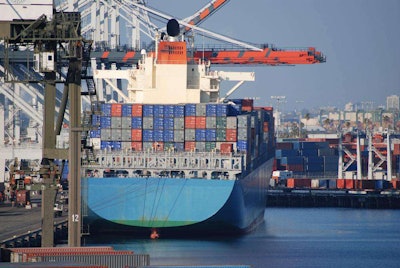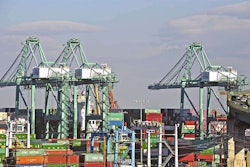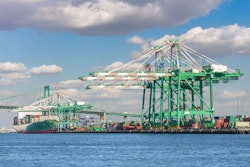 Port of Los Angeles
Port of Los AngelesTruckers serving certain ports may soon have some flexibility in compliance with federal hours-of-service rules, if a push by the American Trucking Associations and some ports is successful.
ATA intends to petition FMCSA in the coming weeks to allow port truckers waivers for some parts of FMCSA’s hours-of-service provisions, says Curtis Whalen, ATA’s Director of Intermodal Carriers Conference.
What provisions they may receive waivers for, however, is not yet clear, Whalen says, and will be fleshed out as ATA crafts its petition.
The move comes as a way to both ease port congestion, which Whalen says continues to worsen at some of the country’s biggest ports, and as a way to help port truckers spend more time driving and moving freight.
Whalen and ATA have their sights set on Southern California ports right now — the Port of LA and the Port of Long Beach, two of the country’s busiest.
Upon examining data collected from tracking devices at those ports, Whalen says port truckers’ waiting times will “underscore the validity of the request” for waivers of certain hours rules.
“The amount of time actually driving will be surprisingly low, I think we’ll find,” Whalen says referencing the data being gathered. “And most of the day when drivers’ hours-of-service clocks are ticking, they’re probably on port property moving no where,” he said.
Whalen says he is looking to see which HOS provisions would be the best to request waivers for that would give drivers more “time resources” but wouldn’t negatively impact safety.
Ports are currently in peak season, he says, due in part to holiday related freight movement, and a 90-day waiver would help ease congestion and help with labor negotiations at the ports.
He hopes to have the petition to FMCSA in the coming weeks and hopes that FMCSA will act quickly upon receipt to grant the waiver.
After the ports in SoCal, Whalen says they’ll turn their attention to the ports in New York, New Jersey and Virginia.
To have the best chance of getting the waivers, Whalen says he and his team must craft individual petitions for each port.
“We’ve got a crisis brewing here right now,” he said. “Truckers in most cases are stuck in the middle, not making any money.”












